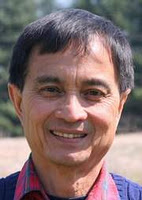FOR PUBLICATION
A nation of 14 million people, of whom 95 percent are Buddhist, Cambodians should be perfect actors for change. Their Lord Buddha preached, “To be idle is a short road to death and to be diligent is a way of life.” He counseled men to be activists and “actionists.” Do Cambodians who talk Buddha’s talk, also walk his talk? As Buddha asked: “What good will do if you do not act upon them?”
AHRC-ETC-057-2011
December 15, 2011
An article by Dr. Gaffar Peang-Meth published by the Asian Human Rights Commission
CAMBODIA: The people must no longer wait for Preah Batr Dhammik to come to their rescue
Dr. Gaffar Peang-Meth
The end of 2011 is filled with less than happy news on Cambodia and her people that dampens the holiday mood. On the first of December, Radio Free Asia presented a somber broadcast on the culture of corruption permeating Khmer youth, starting with kindergarten children, the teaching corps, and moving up to education officials in government. Allegations of corruption at this foundational level do not bode well for Cambodia’s future.
The report on corruption by RFA’s Keo Pich Meta began with an illustrative Khmer saying “Tumpaeng snorng russei,” which refers to bamboo shoots that will grow and replace aging bamboo trees. Bamboo shoots are the nation’s future pillars. The saying counsels children to go to school, study hard, become educated, to help build a prosperous country.
RFA’s report describes unspecified numbers of Khmer children and youth, the bamboo shoots, who are unlikely to grow up to become strong future pillars of a broadly prosperous society. They have fallen prey to societal ills, drugs, laziness, a lack of desire to learn, an avoidance of schooling, among other things. Of course there are children and youth going to school, the report says, but in the course of their schooling it has become customary to bribe teachers for better grades so students can move to the next level.
Having learned a culture of corruption at such a young age, these small bamboo shoots will probably carry the culture of societal ills with them as they grow.
Numbing the spirit, hurting the dignity
Neither was the news from Cambodia in November encouraging to those who advocate for Cambodians’ civil rights. In late November, the small community of people of Boeung Kak Lake – those left from the original 4,000-plus residents who were victims of forced eviction – took to the streets to protest against the real estate firm Shukaku Inc., owned by ruling Cambodian People’s Party Senator Lao Meng Khin. The people of Boeung Kak Lake were holding on desperately to the 12.44 hectares of land that remains after the lake and adjacent 120 hectares were co-opted by the government and leased for 99 years to Shukaku for development.
